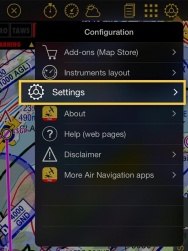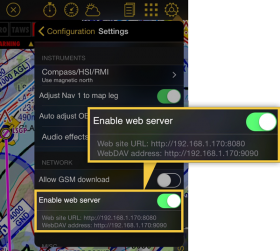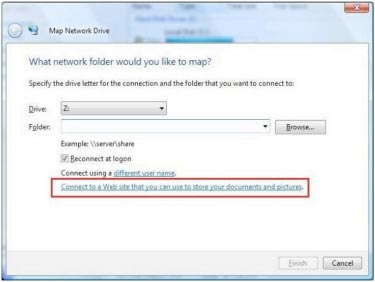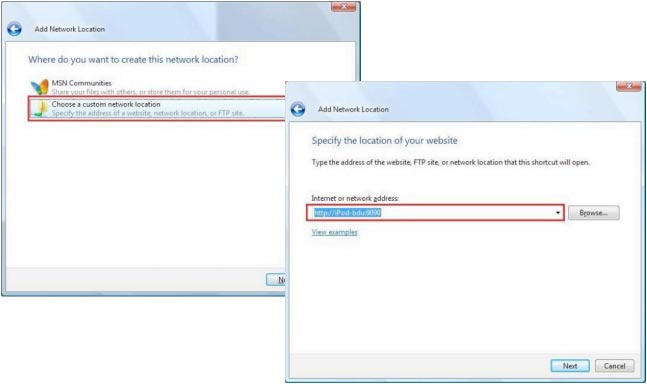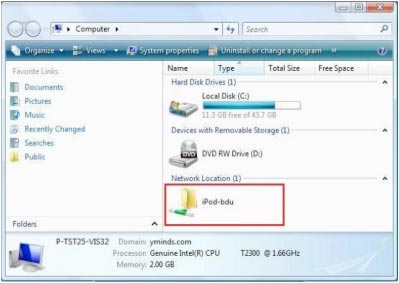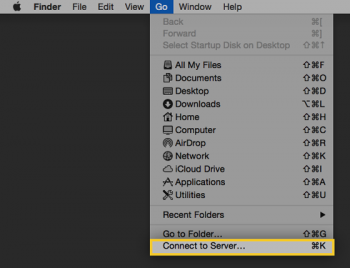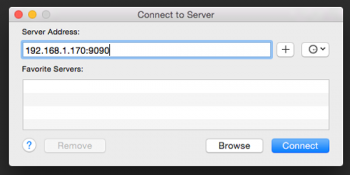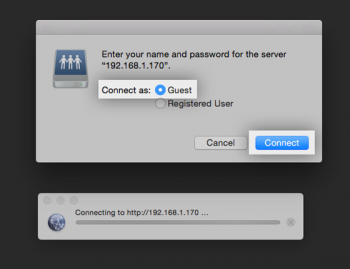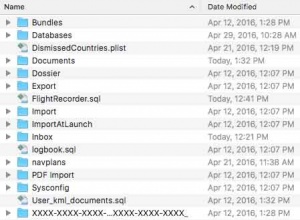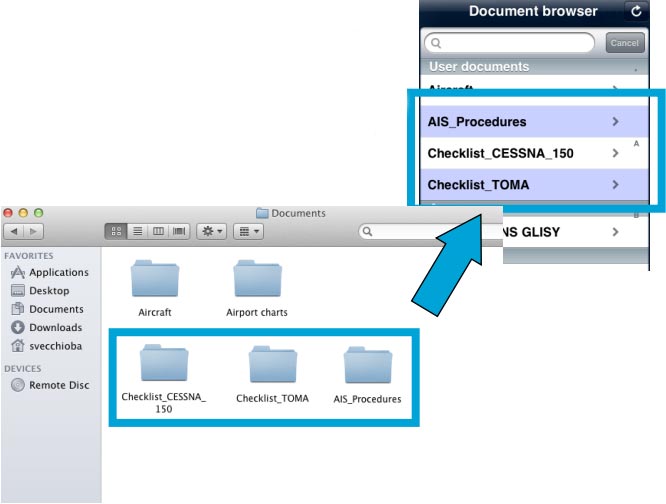(Created page with "---- ===Conectar el WebDAV server desde Mac OS===") |
(Created page with "* Seleccionar “Ir” en el menú; * Seleccionar “Conectar al servidor”; * Ingresar la dirección de IP que muestra Air Navigation Pro: La dirección por defecto puede se...") |
||
| Line 40: | Line 40: | ||
===Conectar el WebDAV server desde Mac OS=== | ===Conectar el WebDAV server desde Mac OS=== | ||
| − | * | + | * Seleccionar “Ir” en el menú; |
| − | * | + | * Seleccionar “Conectar al servidor”; |
| − | * | + | * Ingresar la dirección de IP que muestra Air Navigation Pro: |
| − | + | La dirección por defecto puede ser por ejemplo: http://192.168.1.101:9090; | |
[[File:Attach_PDF_PC_1.png|350px]][[File:Attach_PDF_PC_2.png|350px]] | [[File:Attach_PDF_PC_1.png|350px]][[File:Attach_PDF_PC_2.png|350px]] | ||
Revision as of 19:27, 3 October 2016
Contents
¿Qué es el WebDAV server?
WebDAV es un servidor basado en el protocolo HTTP. Es generalmente soportado por todos los sistemas operativos modernos (Windows, Mac OS X, Linux).
Es posible compartir y la carpeta de «documents» de la aplicación a través de la red de conexión en su computadora, usando el protocolo WebDAV.
La red WebDAV compartida es mucho más práctica, teniendo en cuenta que es posible manipular archivos como si estuviese en un pendrive. Es posible copiar varios archivos al mismo tiempo, e incluso estructuras de carpetas completas en Air Navigation Pro.
La dirección WebDAV aparecerá en los «Ajustes», debajo de la dirección del servidor Webserver.
Se procede de igual forma que para el Servidor Webserver, activando la opción «Activar WebServer» (ver imagen de abajo). La dirección de IP de conexión aparecerá debjajo de dicha opción. Example: http://192.168.1.46:9090
Conectar el WebDAV server desde Windows
- Abrir “Equipo/Mi PC” desde el menú de inicio;
- Desde el menú, seleccionar “Conectar una unidad de red” (Map Network Drive) o hacer click derecho en “Equipo/Mi PC” y seleccionar “Conectar una unidad de red”;
- Usar el enlace de la parte inferior del siguiente mensaje: “Conectarse a un sitio Web para usarlo como almacén de documentos e imágenes”;
- Seguir el procedimiento del asistente de red y la dirección que aparece en la página de ajustes de Air Navigation Pro. La dirección predeterminada puede ser por ejemplo: http://iPode-bdu:9090 or http://192.168.1.101:9090
- Escoja un nombre para su iPhone, que luego aparecerá en la ventana de “Ubicación de red” (My network places);
- Acceder al disco como si fuese un disco duro externo y usarlo de la misma forma.
Conectar el WebDAV server desde Mac OS
- Seleccionar “Ir” en el menú;
- Seleccionar “Conectar al servidor”;
- Ingresar la dirección de IP que muestra Air Navigation Pro:
La dirección por defecto puede ser por ejemplo: http://192.168.1.101:9090;
- Select the option Connect As: Guest
- The device will appear on the desktop as a hard drive symbol.
Content of the «Documents» folder
Once mounted as a network drive, you can access and manage files used by Air Navigation.
Deleting, renaming or installing unsupported files may cause the application to malfunction.
The «Documents» folder contains installed maps and charts. They are stored in the «MapPackages» subfolder.
The maps can be backed up to a computer and copied to another device. However, commercial maps are protected with a certificate that will only work on the device where it was created. If you try to install maps on a second device, you will have to do it through the section «All my products» located in the «Map Store» module to create the certificates.
If you want to backup the maps on your computer, you should also backup the certificates. The certificates are located in the folder named with the hexadecimal string (first folder in the screenshot). You should NOT change the name of the folder or the files inside.
The «databases» folder currently contains only the user database. The user database file is a SQLite file and can be edited by any SQLite 3 editor. This database contains user waypoints, frequencies and runways. They are linked by the waypoint identifier so if you want to input an airport with a runway and some frequencies, the relevant records must have the same value in the «waypoint_id» field. The «Documents» subfolder is where user approach charts and user PDF documents are stored. You can create subfolders inside the «Document» folder. They will appear at the top of the «Documents Browser» module in Air Navigation. The «Airport charts» folder name is reserved for documents linked to an airfield. You can copy documents inside the «Airport charts» folder but they must be grouped in a folder named with the identifier of an airfield, otherwise Air Navigation will ignore them.
The «Elevation» folder is where the free elevation databases are stored. You can backup the elevation files on your computer. You can also copy those files to other devices. The «Logbook.sql» is a SQLite3 database file where the content of Air Navigation's logbook is stored. It can be edited by any SQLite 3 editor. The «Navplans» folder is where saved routes are stored. You can backup and/or copy the files to other devices.
Back to previous page.
